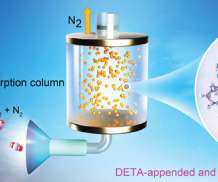Researchers use melamine to create effective, low-cost carbon capture; potential tailpipe application
Green Car Congress
AUGUST 5, 2022
Using an inexpensive polymer called melamine, researchers from UC Berkeley, Texas A&M and Stanford have created a cheap, easy and energy-efficient way to capture carbon dioxide from smokestacks. The low cost of porous melamine means that the material could be deployed widely.











Let's personalize your content